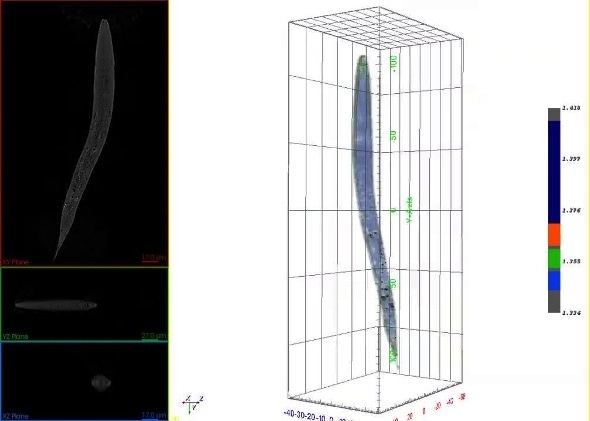Long-term studies of live cells are set to take a significant leap forward with the introduction of a motorized stage and custom-designed stitching software for Tomocube’s holotomography microscopes.

Label-free 3D image of C. elegans: this single, high-resolution frame from the captured video shows the large 3D whole worm image of C. elegeans, acquired without labelling using the Tomocube holotomography microscope equipped with motorized stage.
The automated combination can be fitted to every microscope model in the company’s range and produces large field-of-view images and time-lapse videos.
The combination of holotomography microscopy and the new motorized stage and stitching software is a game-changer for the field of live cell imaging. Because we only need a low-power laser to image live cells and tissues in three dimensions without stains or fluorescent probes, researchers can now conduct long-term studies without the fear of photobleaching and phototoxicity impacting their results.”
Aubrey Lambert, Tomocube
“Even when the studies are conducted on the new Tomocube HT-2, which combines holotomography and 3D fluorescence imaging into one unit for the first time, the potentially-damaging fluorescence observations can be restricted to mapping molecular specificity while relying on the gentler holotomographic quantitative phase imaging for the longer-term observations of the cells,” says Lambert.
Tomocube is the first company to fit a motorized stage to a holotomography microscope and has worked with a team from the renowned Korea Advanced Institute of Science and Technology (KAIST) to develop the custom stitching software for the motorized stage.
Boasting a step size of just 70um, the stage allows specimens up to 8mm x 8mm to be imaged in their entirety. The motorized stage is equipped with ‘Mark & Find’, which enables multiple cell locations to be recorded and rapidly returned to throughout an experiment, and ‘Click & Shift’, which centers a defined target position in the field of view.
Fast image acquisition of holotomographic images on the HT-1 and HT-2 microscopes allows 2D and 3D images to be captured at rates of 150 and 2.5 frames per second respectively across the entire 8mm x 8mm stage acquisition area.
The successful integration means that all the possibilities offered by a large field-of-view in live cell and tissue research are now available for the first time without any sample preparation, staining or labeling.
What’s more, it provides structural and chemical information from the cells at high resolution, including dry mass, cell volume, shapes of sub-cellular organelles, cytoplasmic density, surface area, and deformability.
Specifications
- Step size : 70 um x 70 um
- Maximum FOV (field of view) of single acquisition : 80 um
- Motorized stage acquisition area : 8 mm x 8 mm
- 2D acquisition : 150 fps
- 3D acquisition : 2.5 fps